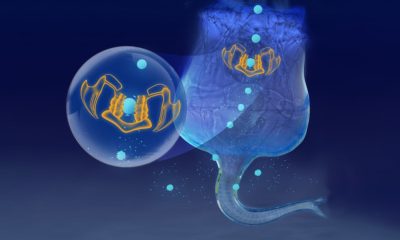Male dominance in movie depictions of tech putting women off careers in AI
“The current state of female representation in the AI industry is grim.”
Published
1 year ago onBy
Talker News
By Pol Allingham via SWNS
Male dominance in big-screen depictions of tech is putting women off careers in Artificial Intelligence (AI) where they are massively under-represented, warns new research.
Women make up just eight percent of workers in films depicting Artificial Intelligence - and half of them are subordinate to men, according to the findings.
University of Cambridge researchers claimed this "dangerous cultural stereotype" is emulated in the real-world shortage of women in the industry.
Across the globe, just 22 percent of real-world AI professionals are women, versus 39 percent across all STEM fields (Science, Technology, Engineering and Medicine.)
Researchers argue the gender chasm is exacerbated by films such as Iron Man and Ex Machina promoting cultural perceptions of AI as “the product of lone male geniuses.”
The importance of fictional representation was highlighted by 63 percent of women in STEM beginning their careers inspired by female The X Files protagonist, scientist Dr. Dana Scully.
Experts fear not employing women to develop AI will let gender bias seep further into the algorithms set to define the future.
The university’s Leverhulme Centre for the Future of Intelligence (LCFI) spokesperson said: “The current state of female representation in the AI industry is grim.”
Currently, 80 per cent of AI professors are men and women make up just 12 percent of authors at AI conferences.
Co-author Dr. Kanta Dihal from LCFI at Cambridge said: “Gender inequality in the AI industry is systemic and pervasive.
“Mainstream films are an enormously influential source and amplifier of the cultural stereotypes that help dictate who is suited to a career in AI.
“Our cinematic stock-take shows that women are grossly underrepresented as AI scientists on screen."
“We need to be careful that these cultural stereotypes do not become a self-fulfilling prophecy as we enter the age of artificial intelligence.”
LCFI academics looked at 1,400 films featuring artificial intelligence between 1920 and 2020 and whittled it down to the 142 most influential.
In those films, they identified 116 characters classed as “AI professionals.”

Of these, 92 percent of all AI scientists and engineers on screen were men.
Just nine women were represented on screen - eight scientists and one CEO.
The virtual gender gap is even vaster than that of the real-world AI workforce, where 78 percent are men.
Of the eight female AI scientists to come out of 100 years of cinema, four were depicted as inferior or subservient to men.
There were no female AI creators on major film screens until 1997, when Austin Powers: International Man of Mystery featured Frau Farbissina and her “Fembots.”
Experts suggest the lack of on-screen female AI professionals could be due to not enough women being behind the camera.
Only two of the 142 influential films featuring AI were directed by women.
These were Captain Marvel, co-directed by Ryan Fleck and Anna Boden, and the Matrix, directed by the transgender Wachowski sisters.
They discovered 37 percent of cinema’s AI scientists are presented as “geniuses” and only one of them is female.
Of the AI professionals on film, 14 percent are portrayed as former child prodigies.
The LCFI team noted previous research revealing that people - across all age groups - associated exceptional intellectual ability with men.
This has been dubbed “the brilliance bias," and researchers argue the stereotype of AI scientists as genius visionaries entrenches the belief that women are not suited to careers in AI.
Co-author Dr. Stephen Cave, director of LCFI, said: “Genius is not a neutral concept.
“Genius is an idea based in gendered and racialised notions of intelligence, historically shaped by a white male elite.
“Some influential technologists, such as Elon Musk, have deliberately cultivated ‘genius’ personas that are explicitly based on cinematic characters such as Iron Man.”
The team also catalogued how cinema’s male scientists create human-like AI as a form of emotional compensation.
Across cinematic history, 22 percent of male AI scientists and engineers create human-like AI to “fulfil their desires.”
This may be replacing a lost loved one, building an ideal lover, or creating AI copies of themselves.
LCFI co-author Dr. Kerry McInerney said: “Cinema has long used narratives of artificial intelligence to perpetuate male fantasies, whether it’s the womb envy of a lone genius creating in his own image, or the god complex of returning the dead to life or constructing obedient women.”
Scientists argued this is exacerbated by overwhelmingly male-dominated corporations or the military providing the film backdrops and settings.
LCFI co-author Dr. Eleanor Drage said: “Women are often confined to lower-paid, lower-status roles such as software quality assurance, rather than prestigious sub-fields such as machine learning.
“This is not just about inequality in one industry. The marginalization of women could contribute to AI products that actively discriminate against women – as we have seen with past technologies.
“Given that science fiction shapes reality, this imbalance has the potential to be dangerous as well as unfair.”
Writing in Public Understanding of Science, the team added a list of the eight female AI scientists and engineers, and one CEO, from a century of cinema.
In chronological order, Frau Farbissina in Austin Powers: International Man of Mystery (1997), Dr. Brenda Bradford in Inspector Gadget (1999), Dr. Susan Calvin in I, Robot (2004).
In the 2010s: Ava in The Machine (2013), Evelyn Caster in Transcendence (2014), Dr Dahlin in Ghost in the Shell (2017), Smiler, a female emoji in The Emoji Movie (2017).
And lastly: Quintessa, the female alien in Transformers: the Last Knight (2017), and Shuri in Avengers: Infinity War (2018).
Stories and infographics by ‘Talker Research’ are available to download & ready to use. Stories and videos by ‘Talker News’ are managed by SWNS. To license content for editorial or commercial use and to see the full scope of SWNS content, please email [email protected] or submit an inquiry via our contact form.
You may like


Egg-laying mammal missing over 60 years photographed for first time in history


Sharkskin could be used to help humans heal wounds


Microscopic plankton rapidly escalating our planet’s plastic problem


Special toothpaste could save lives of people with peanut allergies


Research reveals breast cancer patients being forced out of jobs


Harvard study finds having flexible working hours good for your heart
Other Stories


Touching moment brother and sister reunite after 45 years
"I didn't realize it had been so long."


Meet the 2-year-old chef obsessed with cooking shows
She started cooking when she was 11 months old alongside her mom.


Man running marathon after learning how to walk again
He was in a coma for three weeks after he suffered a fall in October 2020.


Couple find medieval gargoyle imp hiding in their bathroom
The couple took to social media for answers.


Farmer finds ‘unprecedented’ litter of 10 fox cubs
The farmer accidentally dug up their den while working.
Top Talkers

 Food & Drink1 week ago
Food & Drink1 week agoWe eat enough grilled cheeses a year to fill 900 Olympic swimming pools

 Broadcast1 week ago
Broadcast1 week agoOver 50% of Americans trust Google more than their schooling

 Parenting21 hours ago
Parenting21 hours agoSingle mom details struggles of feeding her 12 kids

 Broadcast1 week ago
Broadcast1 week agoAmericans eat enough grilled cheeses a year to fill 900 Olympic swimming pools

 Broadcast3 days ago
Broadcast3 days agoOver 40% of Americans have no clue what a 401k is

 Broadcast1 week ago
Broadcast1 week agoGrocery shopping hungry is costing Americans this much

 Funny1 week ago
Funny1 week agoCops confused by crow mimicking police siren

 Broadcast2 days ago
Broadcast2 days agoHow hard is it for Americans to live sustainably?
